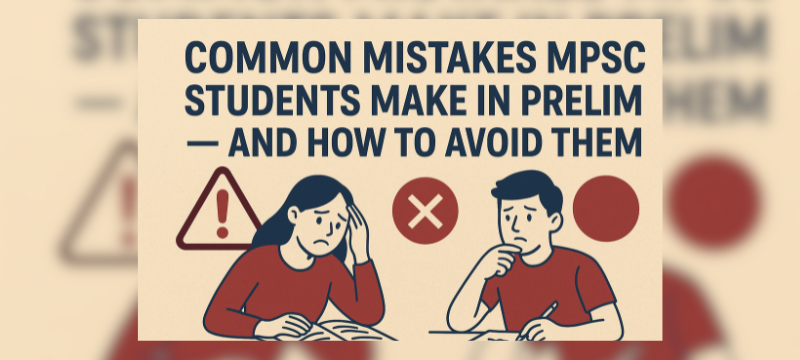
Common Mistakes MPSC Students Make in Prelims — and How to Avoid Them
Preparing for the MPSC Prelims often feels like walking through a maze: plenty of effort, yet no clear direction. Many sincere students study for months, sometimes years, but still fall short of the cutoff. The problem usually isn’t intelligence—it’s small, repeated mistakes that accumulate over time. Understanding these patterns early can save precious attempts and boost confidence.
In this blog, we break down the most common mistakes MPSC aspirants make during Prelims preparation and offer practical, achievable solutions backed by expert insights and real student experiences.
Why This Topic Matters
Every year, students tell us the same story: “I studied everything, still scored less.”
The issue rarely lies in lack of knowledge. It’s about strategy, consistency, and exam-focused preparation. Prelims is a test of accuracy, clarity, and decision-making under pressure—not just memory.
If you’ve ever felt stuck, uncertain, or overwhelmed, you’re not alone. Fixing a few common errors can dramatically improve your score.
What Goes Wrong? The Core Problem Behind Low Prelims Scores
The MPSC Prelims exam is dynamic, analytical, and increasingly unpredictable. Students often rely on old strategies, outdated notes, or random online resources. Many ignore practice tests or misjudge the importance of current affairs. These subtle gaps affect both performance and confidence.
Let’s break down the key mistakes.
Common Mistakes MPSC Students Make in Prelims
1) Studying Everything But Not Revising Enough
Most students “cover the syllabus” but don’t revisit it enough. Prelims rewards those who revise multiple times.
2) Excessive Focus on One Subject
Some spend months on Polity or History but barely touch Environment or Economics—subjects where MPSC frequently asks conceptual questions.
3) Avoiding Test Series
Test anxiety usually comes from fewer mock tests. Many avoid test series to “wait until preparation is perfect,” which never truly happens.
4) Poor Current Affairs Strategy
Depending only on monthly PDFs is a major mistake. Students need an integrated approach: newspapers, reports, and topic-wise CA notes.
5) Guesswork Without Logic
Random guessing increases negative marking. Logical elimination is a skill that requires practice.
6) Ignoring Previous Year Question Papers (PYQs)
PYQs reveal patterns, weightage, and the evolving nature of MPSC questions.
What Causes These Mistakes?
Here are the common triggers that silently pull students off-track:
Expert Insight: Aadesh Karpe Sir, Karmayogi Academy
“Most students don’t fail due to lack of knowledge. They fail because they don’t analyse themselves. The moment a student starts evaluating test performance honestly, improvement becomes natural and measurable.” — Aadesh Karpe Sir
His experience with hundreds of aspirants over the years highlights the importance of practice, evaluation, and structured planning.
What Research Says (Simplified)
A study published in the Journal of Applied Cognitive Psychology (2019) compared different revision methods. Students who used active recall + spaced repetition performed significantly better than those who relied on re-reading notes.
Another study in the Educational Research Review (2021) showed that mock testing boosts retention and improves exam performance, especially in competitive exams where decision-making speed matters.
These findings align with what top MPSC educators observe: consistent practice beats passive reading.
Benefits of Avoiding These Mistakes
Fixing these errors can help students experience:
(Note: Results vary among individuals; consistent effort and proper guidance remain essential.)
What Students Can Expect When They Apply a Correct Strategy
When students shift to a structured and test-oriented approach:
This transformation doesn’t happen overnight, but steady progress becomes visible within a few weeks.
Safety & Suitability: Who Should Follow This Strategy?
This preparation framework is suitable for:
Students must remember that study strategies are personal. What works for one may not suit another. Consulting a qualified mentor or coach for personalised guidance is always advisable.
Final Summary
Avoiding a few common mistakes can significantly improve your MPSC Prelims score. With the right blend of revision, test practice, balanced subject coverage, and current affairs strategy, students can approach the exam with clarity and confidence.
Prelims success isn’t about reading more—it’s about reading smarter, revising consistently, and evaluating yourself honestly. A structured plan and expert guidance can make all the difference.